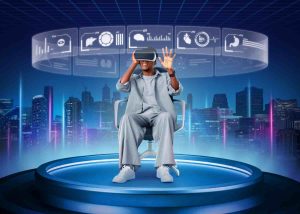In the two years after its debut by Meta, the parent company of Facebook, the metaverse has drawn a great deal of interest from across the globe. Although it’s still in its infancy, many people think this technology will revolutionize the way we engage with digital media. For those unaware, the term “metaverse” refers to a virtual reality platform that provides a fully developed, interactive environment.
The potential use of the metaverse for industry might have a large-scale influence since it could enable many people to work, socialize, and consume information, purchase, and learn online in the virtual world in a more engaging way.
CTI Group has spent the months of January and February 2022 exploring the metaverse and its many facets, including the opportunities and challenges that lie ahead for organizations that adopt the technology, as well as the trends that will reshape the IT landscape in the near future. This article will take a look at the technological building blocks that will allow the metaverse to become a reality. Have a look at the next paragraph for further details.
What Are the Key Tech Components of the Metaverse?

The metaverse is technically complex since it depends on many kinds of technology. It would be challenging to construct interactive virtual environments with such a high level of realism without these technological components.
Explore what kinds of technological infrastructure are needed for an effective metaverse deployment.
Virtual Reality and Augmented Reality
Provide users with the experience of engaging with the metaverse in an immersive fashion. Virtual Reality (VR) technology, when paired with a headset, allows users to enter the virtual world, but Augmented Reality (AR) technology actually brings virtual objects into the real world. These two technologies are commonly employed in the gaming, education, retail, and healthcare industries.
Blockchain
Blockchain paves the way for secure, decentralized transactions between users in the metaverse. The ability to create and own digital assets that can be traded and sold in the metaverse is another benefit of this technology. Some major players in the industry of real estate, for instance, are currently engaged in the trade of virtual real estate.
AI and Machine Learning
Machine learning (ML) and other forms of artificial intelligence are rapidly gaining ground as critical tools for the development of intelligent and adaptive metaverse virtual environments. They can be utilized to make intelligent “characters” that interact with users, delivering a greater sense of life and personality to virtual environments, thanks to this brilliant technology.
Cloud Computing
Cloud computing is just as vital as AI and ML for constructing the metaverse. Both the processing power and data storage for massive metaverses can be available in the cloud. In addition, consumers can use the metaverse from any device, thanks to cloud connectivity.
5G
The 5G network enables real-time interactions in the metaverse by providing high-speed, low-latency connections. For the maximum extent of immersion in the metaverse, high-quality audio and video streaming is also made possible through this network.
Spatial Computing
Furthermore, spatial computing allows for the creation of spatially virtualized environments in the metaverse. As an example of how this innovation might be put to use, think of the possibility of making a map that responds to the position and actions of the user within a virtual environment.
Natural Language Processing
The term “Natural Language Processing” (NLP) refers to a set of tools that enables people to communicate with artificial systems in a natural way. In the metaverse, this tech can be utilized to construct intelligent chatbots and virtual assistants.
The metaverse relies on the aforementioned seven enabling technologies, but there is one more. Yet that’s a topic for its own discussion, which comes up next.
Web 3.0: The Key to Unlocking the Full Potential of the Metaverse?

Web 3.0 is fast becoming a vital tool for the metaverse since it offers the backbone for decentralized, interoperable, and open virtual worlds. Web 3.0 is the most current version of the internet, containing technologies like blockchain and peer-to-peer networks. The metaverse’s deployment will be more trouble-free and safe for end users as a consequence of Web 3.0 improvements.
Web 3.0 makes the metaverse more accessible to all users by removing the requirement for a regulatory organization to oversee activity in the virtual world. Web 3.0 gives consumers complete ownership over their personal information and digital assets, making them more transparent and egalitarian in terms of virtual economic worth.
Metaverse-wide application and platform portability are another great benefit of Web 3.0. This implies that users are no longer restricted to any one platform but may instead freely travel between and engage with others in a variety of virtual environments. For instance, in the metaverse, a user can make a virtual object that can then be used in other virtual worlds without the requirement for a governing body to oversee their transfer.
Web 3.0 also makes using the metaverse safer and more discreet for its users. To reduce the possibility of fraud and to protect the virtual economy from corruption, blockchain, a decentralized technology, will make user transactions inside the metaverse safer and more verifiable.
Last but not least, Web 3.0 fosters a more public and communal setting for growing metaverses. Using decentralized technology, anybody may help construct the metaverse, contributing to a more diverse and unique digital environment.
Read More: Beyond Reality: Navigating the Thrills and Opportunity in Metaverse
Explore the Metaverse at the CTI IT Infrastructure Summit 2023
CTI Group hosts the annual CTI IT Infrastructure Summit to bring together practitioners, suppliers, researchers, academics, and policymakers to explore in-depth trends and challenges that will emerge in the present and the future. The metaverse will be the key subject that will be comprehensively covered at the CTI IT Summit in 2023.
The eighth CTI IT Infrastructure Summit will feature speakers from the IT industry, CEOs, CIOs, and decision-makers under the theme “The Metaverse: Why Your Business Needs to Prepare by Now?” to discuss how prepared businesses are for the presence of metaverse technology.
Professionals from Indonesia, Malaysia, and the Philippines are welcome to attend the CTI IT Infrastructure Summit 2023 in Jakarta on Thursday, March 9th, 2023. This event will garner interest and draw hundreds of participants from various industries each year.
What are you waiting for? Register at the following link right away to take advantage of the chance to learn and exchange directly from professionals and experts.
Get Various IT Solutions from CTI Group
CTI Group provides you with the most recent information about cutting-edge technology that is presently being developed and that will be popular in the future. We make sure that your business runs smoothly with technology that can become a connecting element in creating the metaverse concept in your business. We do this with the help of more than 250 experienced and certified engineers and more than 100 world-class IT brands from 13 subsidiaries. Contact the following page for detailed information about our digital solutions.

